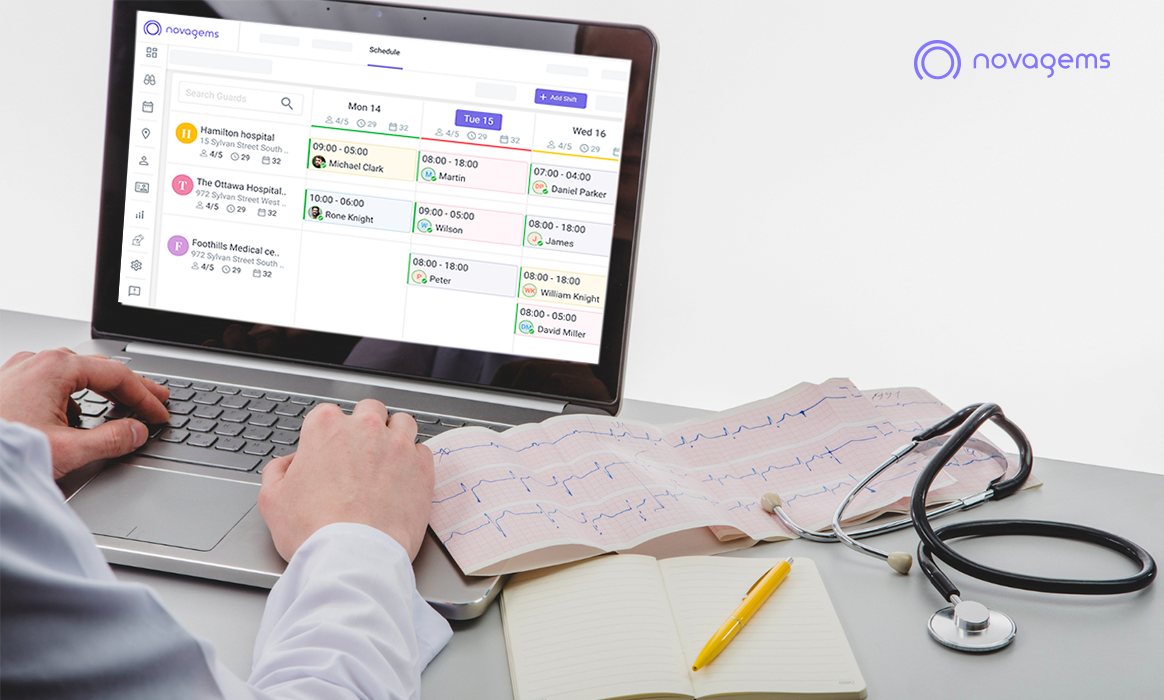5 Tips To Master Hospital Scheduling
Wed, Jul 12, 2023
Read in 5 minutes

Effective hospital scheduling is vital for ensuring seamless operations and delivering quality patient care. The complexities of healthcare demand strategic planning, flexibility, and efficient allocation of resources. In this blog post, we will explore five valuable tips to help hospital administrators and scheduling managers master the art of hospital scheduling. From optimizing staffing to prioritizing communication, these tips will empower healthcare organizations in streamlining hospital operations scheduling processes, enhance staff satisfaction, and ultimately improve patient outcomes.
Tip 1: Efficient Staffing
Efficient staffing lies at the heart of effective hospital scheduling. By analyzing historical data, patient flow patterns, and anticipated demand, administrators can create staffing models that align with the unique needs of their facility. Utilizing scheduling software or tools can help factor in variables such as
- staff availability,
- skill requirements, and
- patient demand
Ultimately ensuring adequate coverage and reducing the risk of overstaffing or gaps in coverage. It is crucial to consider factors like patient acuity levels, staff certifications, and workload distribution while creating schedules. By optimizing staffing, hospitals can provide better patient care, improve staff morale, and reduce unnecessary expenses.
If you are looking for hospital scheduling tips then you must know that efficient staffing is supposed to come at the top. But we know how hard manual scheduling is and the chances of making mistakes in it are higher than ever. That is why a workforce management software is a must for organizations in the healthcare industry. The software will help you automate the tasks and send real time notifications to the staff that are supposed to be on the shift, hence preventing you from being understaffed.
Tip 2: Flexibility And Adaptability
Hospital schedules are inherently dynamic due to the unpredictable nature of healthcare. It is essential to build flexibility into the scheduling process to accommodate unforeseen circumstances, emergencies, or fluctuations in patient volume. Implementing backup staff or on-call personnel can provide a safety net, ensuring that shifts can be filled promptly when needed. Additionally, maintaining clear communication channels is crucial to enable rapid responses to schedule changes or unexpected events. By fostering a culture of adaptability and providing mechanisms for quick adjustments, hospitals can maintain smooth operations even in the face of unexpected challenges.
Mastering hospital scheduling surely is not an easy feat to achieve. But if you are using an efficient scheduling software which is flexible and adaptable to the changes and requirements of your organization then you can take advantage of it to the fullest. Demands and needs of the clients may vary from time to time. That is why it is important to have software that can be easily integrated with other applications to achieve maximum efficiency. You need to have flexibility in hospital scheduling because of the environment you are surrounded with. Unforeseen circumstances may cause your staff to have a delay, you must be ready for such situations.
Tip 3: Prioritize Communication
Effective communication is paramount for successful hospital scheduling. Establishing a centralized platform or system where staff can access up-to-date schedules, request time off, or swap shifts promotes transparency and reduces confusion. Encourage open communication between staff members to facilitate seamless coordination and minimize scheduling conflicts. Regularly update staff about schedule changes or updates, ensuring that everyone remains informed and aligned. Clear communication channels also foster a sense of trust and collaboration within the healthcare team, leading to improved teamwork and overall efficiency.
Effective communication for hospital scheduling is needed to avoid understaffing and overwhelming the staff that is there on the shift. If any staff is caught up with any task you must be able to find instant replacement based on the availability of the schedules of the staff. Avoid scheduling conflicts with the healthcare professionals that are on the leave. Avoid employee burnout with efficient staffing in hospitals
Tip 4: Consider Staff Preferences
Taking into account staff preferences and availability when creating schedules can greatly improve job satisfaction and staff retention. Offer opportunities for employees to provide input on their preferred shift patterns or time-off requests. By finding a balance between staff preferences and operational requirements, hospitals can create schedules that accommodate individual needs while still meeting patient care demands. This consideration enhances employee engagement, reduces burnout, and fosters a positive work environment.
Staff preference considerations are vital for any healthcare organization to work smoothly as this will decrease employee turnover and employee burnout by a large margin. It will be very difficult to have valuable employees in any organization, hence the management must try to retain them before it’s too late. If you consider enhancing staff satisfaction in healthcare scheduling through staff preferences then you are already on the right track.
Tip 5: Continuous Evaluation And Feedback
Regularly reviewing and evaluating the scheduling process is essential for ongoing improvement. Seek feedback from staff regarding the effectiveness of the schedule, workload distribution, and potential issues.
Analyze data and metrics to monitor
- scheduling efficiency,
- identify trends, and
- make data-driven adjustments.
Continuous evaluation and feedback in scheduling enables hospitals to optimize their scheduling practices over time, aligning with evolving patient needs and staff dynamics. By actively incorporating feedback and staying responsive to changes, hospitals can achieve greater operational efficiency and enhance patient care outcomes. Happy employees sure are trending these days.
Conclusion
Mastering hospital scheduling requires a combination of strategic planning, effective communication, and continuous evaluation. By implementing the five tips outlined in this blog post—efficient staffing, flexibility and adaptability, prioritizing communication, considering staff preferences, and continuous evaluation and feedback—hospital administrators and scheduling managers can optimize their scheduling practices. Ultimately, these improvements lead to streamlined operations, enhanced.
Efficient staffing in hospitals can be achieved with Novagems, a smart automation tool that will make your task of making schedules so easy that you might even start enjoying it! Optimal patient care through scheduling is in trend these days and can be easily achieved if you have a smart scheduling software at your hands.
Get a Free Trial
Sign up For Newsletter
Latest Blog Posts
Get Started
Start being productive & grow your business
with Novagems




